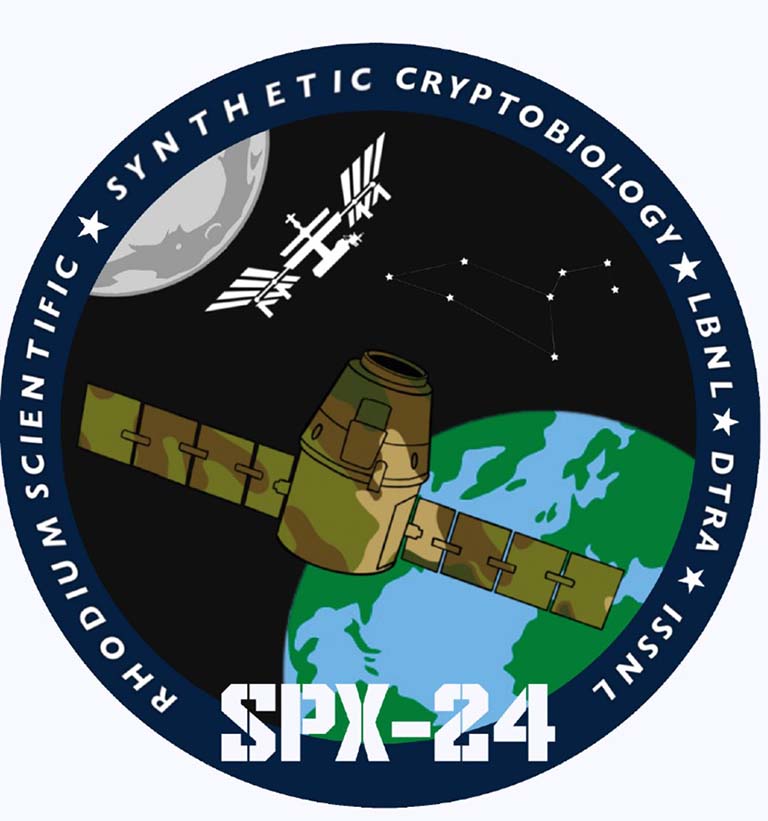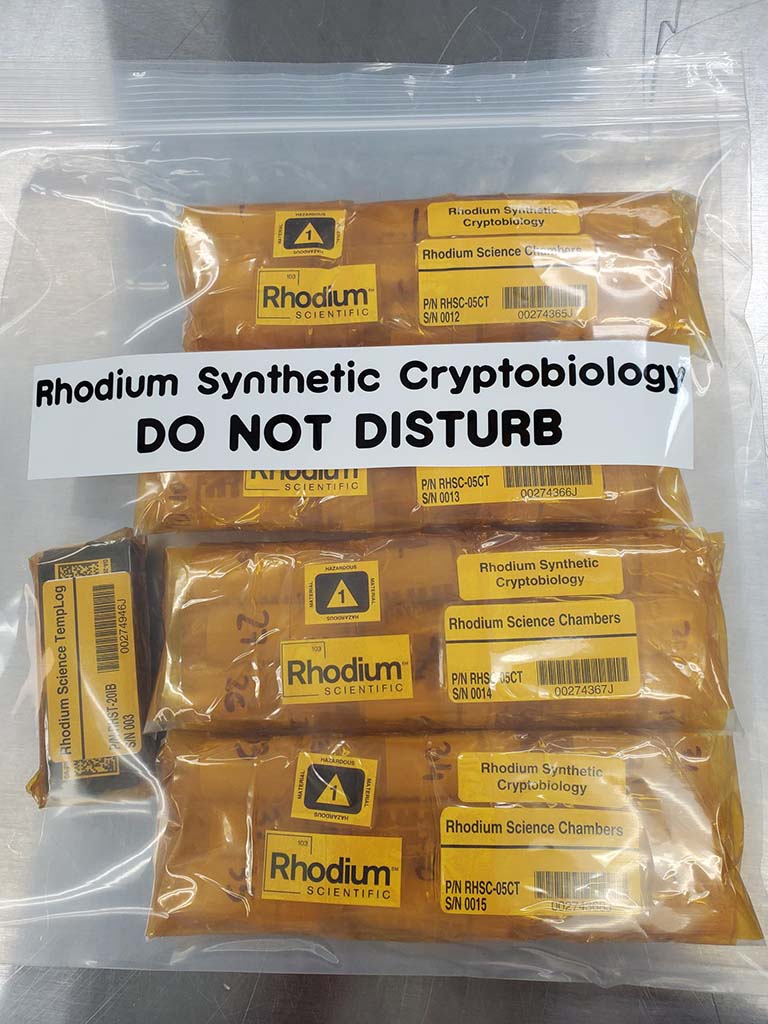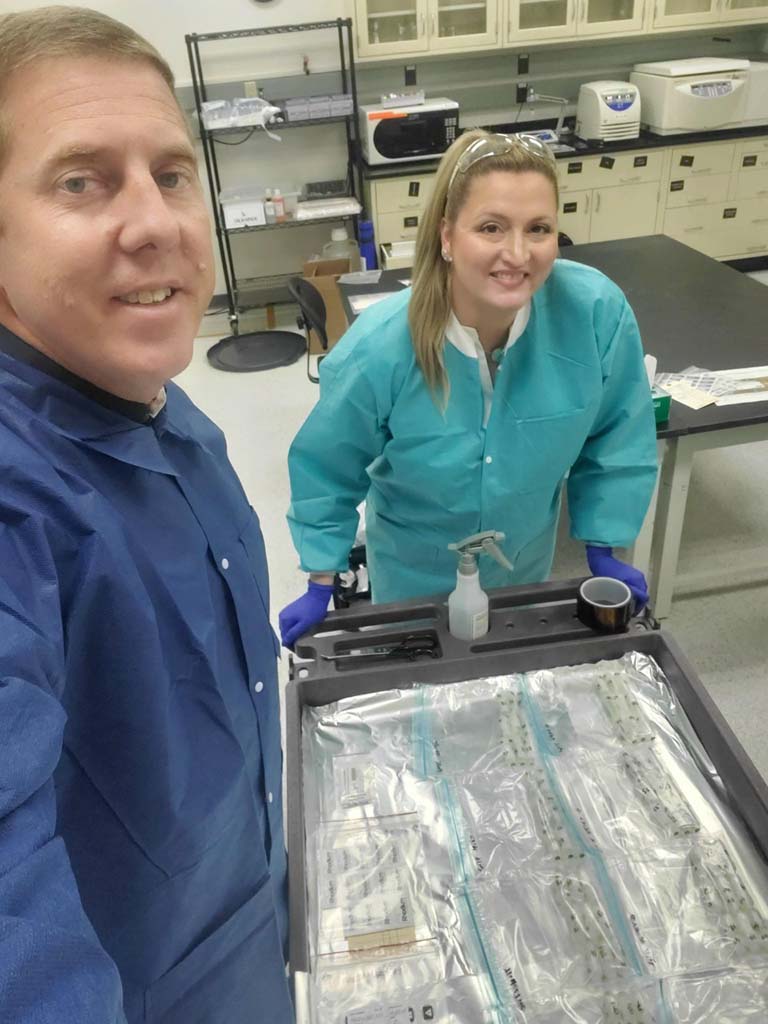Synthetic Cryptobiology May Revolutionize Secure Data Transport

Bioengineered cyanobacteria
Media Credit: Berkley Lab
January 21, 2022 • By Olivia Gamez Holzhaus, Guest Contributor, Founder and CEO of Rhodium Scientific, LLC

“Rhodium Synthetic Cryptobiology” mission patch
Media Credit: Hector Aaron Garcia
At the heart of synthetic biology and bioengineering is DNA, nature’s carrier of genetic information and the biological instructions that make each organism unique. Additionally, data storage within DNA is a rapidly advancing field, for not only biotechnology but also energy and materials science applications. However, to store and carry data, the DNA must avoid damage, degradation, and mutation. Scientists are turning to blue-green algae as an unlikely hero for the safe transport of these data—all the way to space and back.
In an experiment that recently launched to the International Space Station (ISSInternational Space Station), scientists from Lawrence Berkeley National Laboratory are exploring the ability of cyanobacteria, or blue-green algae, to store and protect DNA from damage as it travels to space. The project is funded by the Department of Defense’s (DoD) Defense Threat Reduction Agency and supported by ISS National Laboratory Commercial Service ProviderImplementation Partners that own and operate commercial facilities for the support of research on the ISS or are developing future facilities. Rhodium Scientific.
“Cyanobacteria are fascinating organisms with cool natural functions like photosynthesis and viability under extreme conditions,” said Anne Kakouridis, a postdoctoral researcher at Berkeley Lab. “Our goal is to use these features of cyanobacteria, already present in nature, to figure out ways to transport DNA more easily and reliably.”

The Rhodium Synthetic Cryptobiology samples and Rhodium Science TempLog in flight configuration prior to being located inside the SpaceX Dragon capsule
Media Credit: Rhodium Scientific
This novel approach to information transport not only protects the DNA sequence, which is how data is encoded, but it also conceals the data, storing the information securely. This cryptic transport would be game changing for transporting data over long distances or into extreme environments, such as the extreme g-force of a rocket launch and the radiation exposure from spaceflight.
For this flight experiment, which launched on SpaceX’s 24th Commercial Resupply Services mission(Abbreviation: CRS mission) A CRS mission is a cargo resupply mission contracted by NASA to deliver supplies and research to the International Space Station on commercial spacecraft as part of the CRS contract with three commercial companies. As part of CRS missions, experiments currently return to Earth on SpaceX Dragon spacecraft that splash down in the ocean., the proof of concept is elegantly and simply designed. The cyanobacteria were engineered using synthetic biology to contain a plasmid, or small loop of DNA, that contains the code for a form of antibiotic resistance used in lab studies. Then the bacteria were desiccated, or dried out, before being securely packaged and sent off to the launch pad.
The experiment purposefully has no special incubator or freezer—it is being stored at ambient temperature, safely contained within the flight-certified Rhodium Science Chamber Facility—and astronauts will not interact with the package while in flight. Once the bacteria return to Earth, they will be rehydrated, and scientists will determine whether the plasmid DNA suffered any damage and whether the exact genetic data can be correctly read from sequencing the plasmid DNA.
“It’s exciting to imagine that simple microbiology procedures could hold the key to easy transport of DNA,” said Aindrila Mukhopadhyay, a senior scientist in the BioSciences Area of Berkeley Lab. “This project, if successful, will get us one step closer to being able to create materials when and where we need them by using blueprints encoded in DNA and safely carried by cyanobacteria.”

Commercial Service Provider team conducting preflight sample preparations inside the Space Station Processing Facility in KSC (Left: Dr.
Heath Mills, Right: Olivia Gamez Holzhaus
Media Credit: Rhodium Scientific
This synthetic cryptobiology approach holds promise to be sufficiently “rugged,” or protective against extreme or resource-limited environments, to enable transport of DNA and/or any encoded data for use in production of materials and products in orbit (including scalable, on-demand bioproduction and mission critical technology components) or for use here on the ground in defense and security applications. Moreover, it is simple and inexpensive, making it easily implemented for broad applications.
This is the fourth experiment to use Rhodium Scientific’s Quality, Industry Compatible (QuIC) Space Process, a process developed by Rhodium and vetted by the DoD to rapidly transport advanced science investigations to and from space using industry-standard quality assurance protocols. The QuIC Space Process ensures an experiment’s entire chain of custody is repeatable and that if a discovery is made, the result can be translated into product that withstands the rigor of regulated industries.